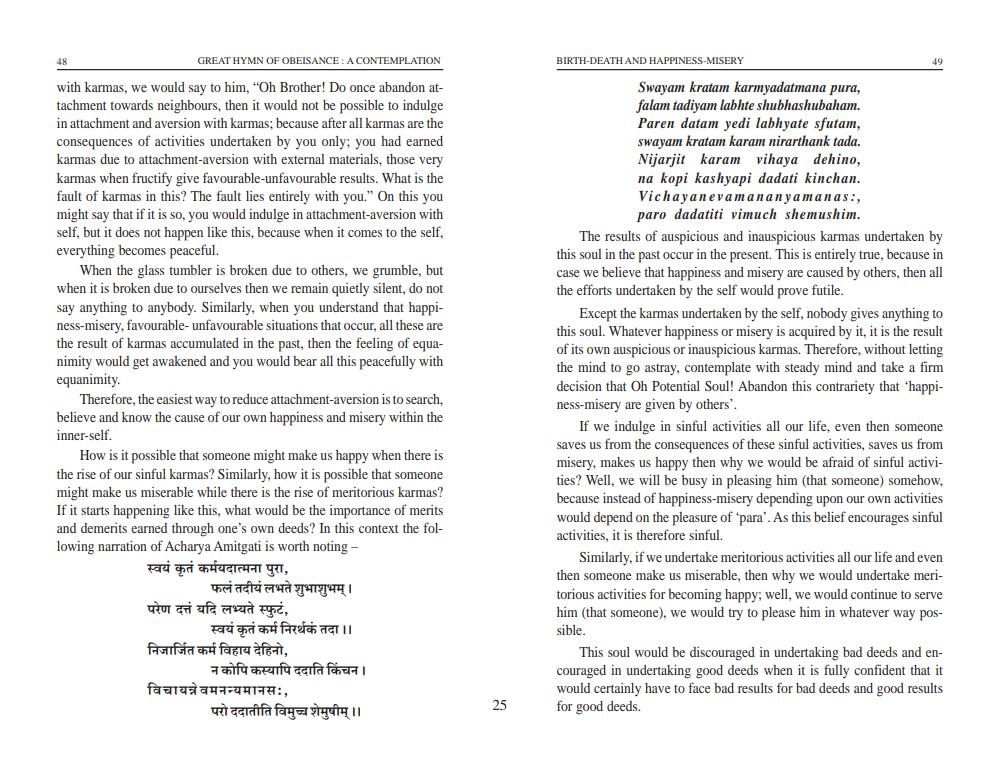________________
GREAT HYMN OF OBEISANCE: A CONTEMPLATION
with karmas, we would say to him, "Oh Brother! Do once abandon attachment towards neighbours, then it would not be possible to indulge in attachment and aversion with karmas; because after all karmas are the consequences of activities undertaken by you only; you had earned karmas due to attachment-aversion with external materials, those very karmas when fructify give favourable-unfavourable results. What is the fault of karmas in this? The fault lies entirely with you." On this you might say that if it is so, you would indulge in attachment-aversion with self, but it does not happen like this, because when it comes to the self, everything becomes peaceful.
48
When the glass tumbler is broken due to others, we grumble, but when it is broken due to ourselves then we remain quietly silent, do not say anything to anybody. Similarly, when you understand that happiness-misery, favourable- unfavourable situations that occur, all these are the result of karmas accumulated in the past, then the feeling of equanimity would get awakened and you would bear all this peacefully with equanimity.
Therefore, the easiest way to reduce attachment-aversion is to search, believe and know the cause of our own happiness and misery within the inner-self.
How is it possible that someone might make us happy when there is the rise of our sinful karmas? Similarly, how it is possible that someone might make us miserable while there is the rise of meritorious karmas? If it starts happening like this, what would be the importance of merits and demerits earned through one's own deeds? In this context the following narration of Acharya Amitgati is worth noting -
स्वयं कृतं कर्मयदात्मना पुरा,
फलं तदीयं लभते शुभाशुभम् । परेण दत्तं यदि लभ्यते स्फुटं,
स्वयं कृतं कर्म निरर्थकं तदा ।।
निजार्जित कर्म विहाय देहिनो,
न कोपि कस्यापि ददाति किंचन ।
1
विचायन्त्रे वमनन्यमानसः,
परो ददातीति विमुच्च शेमुषीम् ॥
25
BIRTH-DEATH AND HAPPINESS-MISERY
Swayam kratam karmyadatmana pura, falam tadiyam labhte shubhashubaham. Paren datam yedi labhyate sfutam, swayam kratam karam nirarthank tada. Nijarjit karam vihaya dehino, na kopi kashyapi dadati kinchan. Vichayanevamananyamanas, paro dadatiti vimuch shemushim.
49
The results of auspicious and inauspicious karmas undertaken by this soul in the past occur in the present. This is entirely true, because in case we believe that happiness and misery are caused by others, then all the efforts undertaken by the self would prove futile.
Except the karmas undertaken by the self, nobody gives anything to this soul. Whatever happiness or misery is acquired by it, it is the result of its own auspicious or inauspicious karmas. Therefore, without letting the mind to go astray, contemplate with steady mind and take a firm decision that Oh Potential Soul! Abandon this contrariety that 'happiness-misery are given by others'.
If we indulge in sinful activities all our life, even then someone saves us from the consequences of these sinful activities, saves us from misery, makes us happy then why we would be afraid of sinful activities? Well, we will be busy in pleasing him (that someone) somehow, because instead of happiness-misery depending upon our own activities would depend on the pleasure of 'para'. As this belief encourages sinful activities, it is therefore sinful.
Similarly, if we undertake meritorious activities all our life and even then someone make us miserable, then why we would undertake meritorious activities for becoming happy; well, we would continue to serve him (that someone), we would try to please him in whatever way possible.
This soul would be discouraged in undertaking bad deeds and encouraged in undertaking good deeds when it is fully confident that it would certainly have to face bad results for bad deeds and good results for good deeds.




